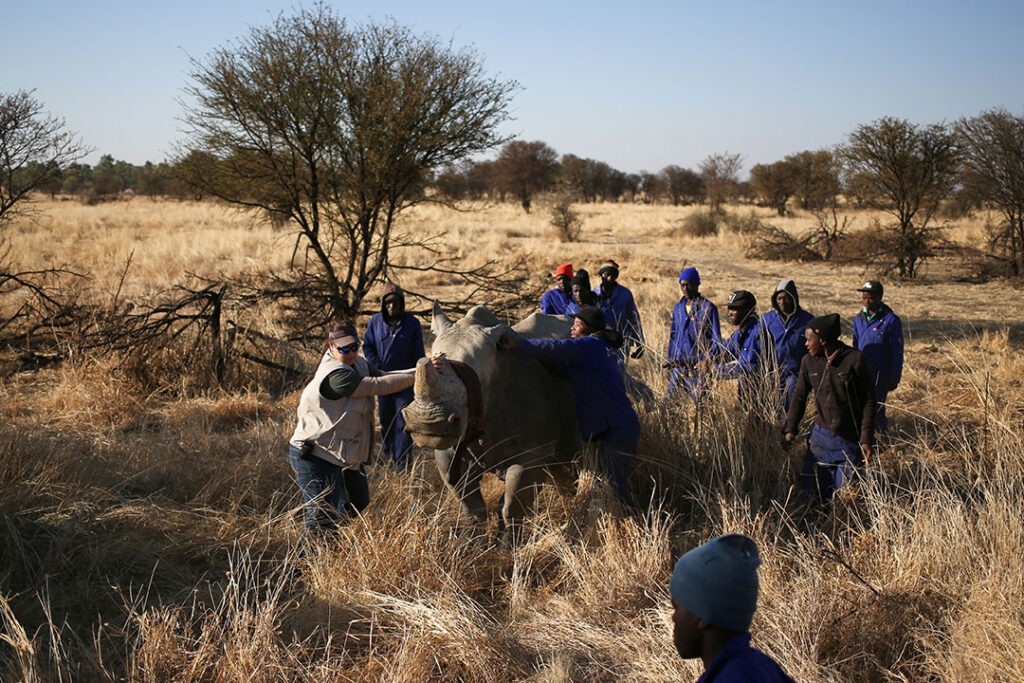ADF STAFF
Rhino poaching in South Africa’s North West province has increased since officials mandated lockdowns to prevent the spread of COVID-19.
With tourism at a standstill, criminals keen on pilfering and selling wildlife parts are targeting the region’s vulnerable farms. Rhino horns can sell for $65,000 per kilogram, and demand is rising, particularly in Asia, where it is seen as a status symbol and used in traditional Chinese medicine.
The situation sometimes leads to violence between criminals and anti-poaching units. One would-be poacher was killed and two others injured in a recent gunbattle with authorities, who confiscated several firearms and a haul of ammunition.
“Just as soon as the lockdown hit South Africa, we started having an incursion almost every day,” Nico Jacobs, founder of Rhino 911, a local rescue organization, told The South African.
The situation is similar in Kenya, where poachers are increasingly killing elephants, lions, leopards, giraffes, zebras, impalas and other animals. Conservationists say wildlife is slaughtered for food by people who are facing pandemic-related unemployment, or for illegal trade.
Poaching also increased in Zimbabwe as soon as a lockdown was initiated, with criminals exploiting the crisis to slaughter elephants, lions, rhinos and buffalos.
Throughout southern, central and eastern Africa, pangolins, already the world’s most-trafficked mammal, are being increasingly trapped by poachers, who kill up to 2.7 million every year, according to the African Wildlife Foundation.
As with other poached animals from Africa, many pangolins are illegally sold on China’s black market. Their meat is considered a delicacy, and their scales are used in traditional Chinese medicine. Although there is no evidence the scales have medicinal value — they are made of keratin, as are human fingernails — some people believe the scales can cure arthritis and cancer, improve circulation, and increase virility, among other benefits.
Increased poaching isn’t only a danger to animals; experts say the practice can lead to future pandemics. The related destruction of ecosystems has reduced natural habitats, making animals live closer to one another and to humans, Marie Quinney, a specialist with the World Economic Forum’s Nature Action Agenda, wrote on the organization’s website. She cited studies that show that 70% of new infectious diseases, including SARS and AIDS, came from wild animals.
As the world struggles to halt the spread of COVID-19, there are increasing calls to eliminate sales of wildlife for consumption because the pandemic is believed to have originated at a Chinese wet market late last year. Pandemics such as SARS and the bird flu also originated in Chinese wet markets.
In April, 339 animal welfare and conservation groups signed a letter urging the World Health Organization to support an international ban on wildlife markets. Among those who signed the letter was Yvette Taylor, director of the Lawrence Anthony Earth Organization, a nonprofit conservation group in Durban, South Africa.
“The systematic plunder of Africa to supply these markets must be stopped. It has made criminals of African people who participate in poaching and will lead to an ecosystem collapse, which will further threaten food security,” Taylor told South Africa’s Independent Online. “The trade in wildlife has now impacted the entire planet and is likely to create poverty and suffering as a result. It is time that the world stood together to end this barbaric practice.”

